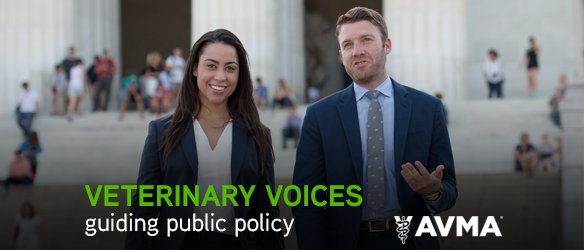What do the election results mean for veterinarians?
 Last night, Democrats took control of the U.S. House of Representatives, and Republicans maintained control of the U.S. Senate. As with any change of political power, the fresh faces in Congress will bring a new agenda. What will it mean for veterinary medicine?
Last night, Democrats took control of the U.S. House of Representatives, and Republicans maintained control of the U.S. Senate. As with any change of political power, the fresh faces in Congress will bring a new agenda. What will it mean for veterinary medicine?
We expect to see both new opportunities and challenges open up in Congress as a result of Tuesday’s midterm election, and we’ll be looking for opportunities to advance causes that are vital to the success of veterinarians and the health of our patients. Here is an overview to help you understand how the election results will impact veterinary medicine and the AVMA’s advocacy work on behalf of our profession.
Veterinarians re-elected
All three veterinarians running for re-election to Congress – U.S. Reps. Ted Yoho (R-Fla.), Kurt Schrader (D-Ore.) and Ralph Abraham (R-La.) – won their races and will continue representing our profession in the House. Veterinarian candidate Karen McCormick was not successful in her challenge to incumbent U.S. Rep. Ken Buck (R-Col.), who represents Colorado’s 4th Congressional District.
Before the new Congress takes office
The current Congress has until Jan. 3 to complete any remaining business before the new Congress takes over in 2019. Congress is expected to use this period to finalize the 2018 farm bill – but with the change of party control coming in January, there is a chance this could be delayed. For the AVMA, this means we’ll continue our work ensuring that veterinary priorities are included in the bill, regardless when the final bill is approved.
Before the Jan. 3 deadline, Congress will attempt to finalize funding bills for 2019 and may consider a supplemental aid package to help with recovery from recent natural disasters. Lawmakers also are likely to extend an exemption from the Federal Motor Carrier Safety Administration’s Hours of Service requirements for livestock haulers, which is important to animal welfare. Additionally, Congress could consider retirement and tax legislation that might affect veterinarians.
Looking ahead to 2019
Retirement and tax provisions are sure to remain in focus after the new Congress is seated and working in 2019. If the farm bill is not completed during the lame-duck period, it will certainly be a priority for both chambers during the 116th Congress as well.
The opioid crisis and drug prices likely will be another area of focus for the new Congress, and we may see additional scrutiny of drug production and pricing. Environmental policies affecting livestock operations may be examined more closely, too. Under the new House leadership, the chamber may seek changes to healthcare and higher education policies, although it is more likely that we might see stricter congressional oversight of the administration’s healthcare and education programs, including the Public Service Loan Forgiveness Program.
Finally, the next Congress will face budget issues, including an agreement to lift spending caps to provide adequate and continued funding for federal programs such as the Veterinary Medicine Loan Repayment Program, Veterinary Services Grant Program and the National Animal Health Laboratory Network. Funding also will be needed for U.S. Department of Agriculture agencies such as the Food Safety and Inspection Service, the National Institute of Food and Agriculture, and the Animal and Plant Health Inspection Service.
While these are some of the major issues we expect to address in coming months, it’s almost certain that new issues will arise as well. The AVMA will continue working to ensure Congress understands the veterinary perspective on any issues that affect our profession. AVMA is a nonpartisan organization, and we work with all lawmakers to advance veterinary medicine.
At the start of the 116th Congress, many new members of Congress will be eager to hear from their constituents. We encourage you to reach out to your lawmakers to educate them about policies that would impact the veterinary profession. If you’re interested in receiving occasional emails on timely, high-stakes opportunities to contact Congress and make a difference, you can join AVMA’s Congressional Advocacy Network. You can also use the network to look up contact information for your members of Congress.


Comments
Add New Comment